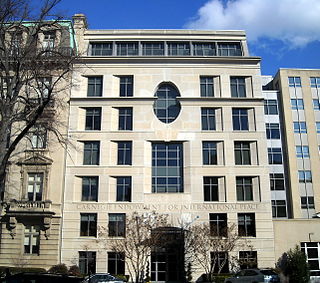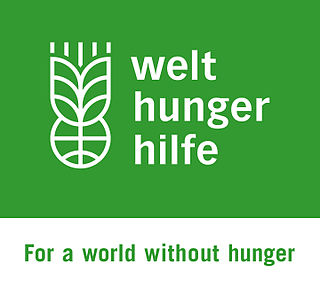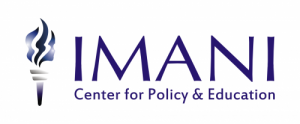A think tank, or policy institute, is a research institute that performs research and advocacy concerning topics such as social policy, political strategy, economics, military, technology, and culture. Most think tanks are non-governmental organizations, but some are semi-autonomous agencies within government or are associated with particular political parties, businesses or the military. Think-tank funding often includes a combination of donations from wealthy individuals and personal contributions, with many also accepting government grants.

The White House National Security Council (NSC) is the principal forum used by the President of the United States for consideration of national security, military, and foreign policy matters with senior national security advisors and Cabinet officials, and is part of the Executive Office of the President of the United States. Since its inception in 1947 during the administration of President Harry S. Truman, the function of the Council has been to advise and assist the President on national security and foreign policies. The Council also serves as the President's principal arm for coordinating these policies among various government agencies. The Council has counterparts in the national security councils of many other nations.

Scouting in Iowa has a long history, from the 1910s to the present day, serving thousands of youth in programs that suit the environment in which they live.

The Federation of American Scientists (FAS) is an American nonprofit global policy think tank with the stated intent of using science and scientific analysis to attempt to make the world more secure. FAS was founded in 1945 by scientists who worked on the Manhattan Project to develop the first atomic bombs. The Federation of American Scientists also aims to reduce the amount of nuclear weapons that are in use, and prevent nuclear and radiological terrorism. They hope to present high standards for nuclear energy's safety and security, illuminate government secrecy practices, as well as track and eliminate the global illicit trade of conventional, nuclear, biological and chemical weapons. With 100 sponsors, the Federation of American Scientists claims that it promotes a safer and more secure world by developing and advancing solutions to important science and technology security policy problems by educating the public and policy makers, and promoting transparency through research and analysis to maximize impact on policy. FAS projects are organized in three main programs: nuclear security, government secrecy, and biosecurity. FAS played a role in the control of atomic energy and weapons, as well as better international monitoring of atomic activities.
The Atlantic Council is an American think tank in the field of international affairs, favoring Atlanticism, founded in 1961. It manages ten regional centers and functional programs related to international security and global economic prosperity. It is headquartered in Washington, D.C. It is a member of the Atlantic Treaty Association.

The Carnegie Endowment for International Peace (CEIP) is a nonpartisan international affairs think tank with its headquarters in Washington D.C. and centers in Moscow, Beirut, Beijing, Brussels, and New Delhi. Founded in 1910 by Andrew Carnegie, the organization describes itself as being dedicated to advancing cooperation between nations and promoting active international engagement by the United States.

Stockholm International Peace Research Institute (SIPRI) is an international institute based in Stockholm. It was founded in 1966 and provides data, analysis and recommendations for armed conflict, military expenditure and arms trade as well as disarmament and arms control. The research is based on open sources and is directed to decision-makers, researchers, media and the interested public.

The School of Global Policy and Strategy (GPS) at the University of California San Diego, formerly the Graduate School of International Relations and Pacific Studies (IR/PS), is devoted to the study of international affairs, economics, and policy education. Until 2015, it stood as the only professional school of international affairs that was exclusively focused on Asia and the Americas.
The Rockefeller Brothers Fund (RBF) is a philanthropic foundation created and run by members of the Rockefeller family. It was founded in New York City in 1940 as the primary philanthropic vehicle for the five third-generation Rockefeller brothers: John, Nelson, Laurance, Winthrop and David. It is distinct from the Rockefeller Foundation. The Rockefellers are an industrial, political and banking family that made one of the world's largest fortunes in the oil business during the late 19th and early 20th centuries.
The Stimson Center, named after American statesman, lawyer, and politician Henry L. Stimson, is a nonprofit, nonpartisan think tank which aims to enhance international peace and security through a combination of analysis and outreach. The Center's stated approach is pragmatic – seeking to provide policy alternatives, solve problems, and overcome obstacles towards a more peaceful and secure world.
The Century Foundation is a progressive think tank headquartered in New York City with an office in Washington, D.C. It was founded as a nonprofit public policy research institution on the belief that the prosperity and security of the United States depends on a mix of effective government, open democracy, and free markets. Its staff, fellows, and authors produce books, reports, papers, pamphlets, and online publications. The Foundation also hosts policy-related events and workshops for various audiences, including policy experts, journalists, college students and other academics, and the general public. It also manages several ongoing policy projects and operates a number of websites on various policy-related topics.
Claude Maxwell "Max" Stanley (1904–1984) was an American civil engineer, entrepreneur, philanthropist, peace activist, author and world citizen. He founded Stanley Consultants, an engineering and consulting firm, in 1939 with his younger brother Art. In 1943 he co-founded HON Industries, originally named Home-O-Nize, an office furniture manufacturing company; and, along with his wife Elizabeth, created and endowed the Stanley Foundation in 1956, which is a global policy organization which focuses on mitigating climate change, avoiding the use of nuclear weapons, and preventing mass violence and atrocities. All three organizations are headquartered in Muscatine, Iowa, United States.

The Israel Policy Forum is an American Jewish organization that works for a negotiated two-state solution to the Israeli–Palestinian conflict though advocacy, education and policy research. The organization appeals to American policymakers in support of this goal and writes opinion pieces that have appeared in many Jewish and non-Jewish newspapers. The organization was founded in 1993.
Stefan Schurig is the Secretary General of the Foundations Platform F20, an international network of foundations and philanthropic organizations.
The National Bureau of Asian Research (NBR) is an American nonprofit, research institution based in Seattle, Washington, with a branch office in Washington, D.C. The organization's mission is to inform and strengthen Asia-Pacific policy. NBR brings together specialists, policymakers, and business leaders to examine economic, strategic, political, globalization, health, and energy issues affecting U.S. relations with East, Central, Southeast and South Asia and Russia. Richard J. Ellings is the current president.
The University of Iowa Stanley Museum of Art is a visual arts institution that is part of the University of Iowa in Iowa City, Iowa, United States. It is accredited by the American Alliance of Museums.

Deutsche Welthungerhilfe e. V. – or Welthungerhilfe for short – is a German non-denominational and politically independent non-profit and non-governmental aid agency working in the fields of development cooperation and humanitarian assistance. Since its founding in 1962, it has used 4.2 billion euros to carry out more than 10.369 projects in 70 countries in Africa, Latin America and Asia.[1] Welthungerhilfe holds the Seal of Approval awarded by Deutsches Zentralinstitut für Soziale Fragen (DZI). In 2014, Welthungerhilfe and the aid organization World Vision International were announced the most transparent German organizations.

The IMANI Center for Policy and Education is a think tank based in Accra, Ghana. As a member of the Atlas Economic Research Foundation, the think tank applies free market solutions to intricate domestic social problems.
The Global Challenges Foundation is a Swedish non-profit organization that seeks to raise awareness of global catastrophic risk and the global governance necessary to handle these risks. This includes examining models for UN reform, as well as initiating new ideas for a functioning global governance. It was founded in 2012 with a donation by the Hungarian billionaire László Szombatfalvy who lives in Sweden.

ClimateWorks Foundation is a San Francisco-based nonprofit organization founded in 2008. ClimateWorks Foundation's mission is to slow global warming by funding other organizations internationally to help find best practice solutions to cut down on carbon dioxide (CO2) emissions.









